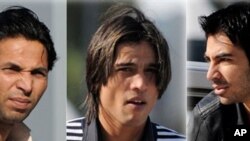Authorities in Britain have filed criminal conspiracy and bribery charges against three star players on Pakistan's national cricket team for alleged match fixing last year during a test match in London.
Prosecutors said Friday that Pakistan's former test captain Salman Butt, and opening bowlers Mohammad Asif and 18-year-old Mohammad Amir, are charged with conspiracy to obtain and accept corrupt payments, and with conspiracy to cheat. The players maintain they are innocent of any wrongdoing.
March hearing scheduled
Their first court hearing is scheduled for March 17 in London. The three professional athletes could each face up to nine years in prison and a large fine if found guilty.
The International Cricket Council last year suspended Butt, Asif and Amir pending the outcome of its own investigation into the alleged cheating plot. The sport's world governing body is scheduled to announce its ruling Saturday in Doha, Qatar.
The Pakistani cricketers are accused of taking more than $200,000 in bribes to deliberately bowl penalties called "no-balls" at prearranged points during the fourth test against England last August at Lord's Cricket Ground in London. Anyone with prior knowledge of the so-called "spot fixing" plan could win huge profits from placing bets on those specific elements of the match.
Will they appear in court?
Last September, Salman, Asif and Amir spoke with the London Metropolitan Police, and said they would voluntarily return to Britain at the request of authorities. On Friday, prosecutors said Britain will seek to extradite the men if they fail to appear in court next month.
The London-based sports agent who represents the trio, Mazhar Majeed, also is charged in the case, and ordered to appear at the same March 17 hearing in London. He is accused of arranging bribes and accepting the money from a third party.
In Britain, obtaining and accepting corrupt payments carries a seven-year prison sentence and an unlimited fine. The maximum punishment for cheating conspiracy is two years behind bars.
The ICC tribunal handling the case has the authority to impose lifetime bans against the players, if they are found guilty based on the outcome of its separate investigation.
Some information for this report was provided by AFP and Reuters.




